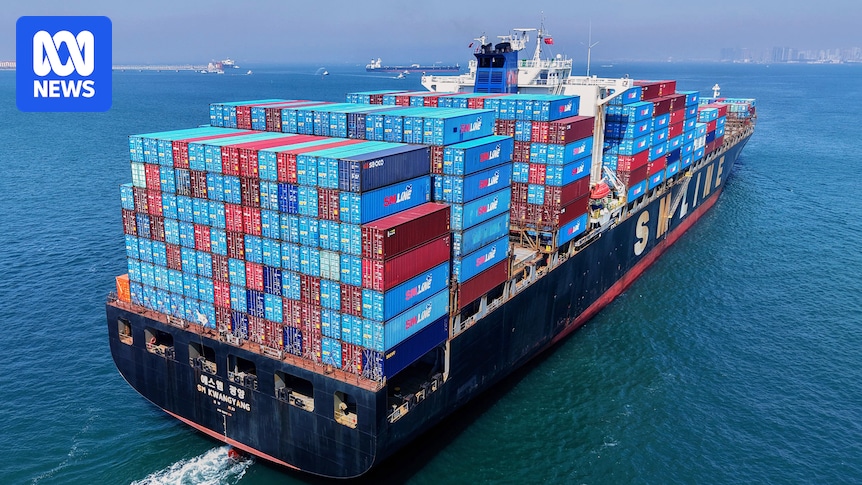Australia has a timely opportunity to become the world’s dominant provider of green shipping fuel, says Superpower Institute chair Rod Sims.
If Australia secured 25 per cent of the green shipping fuel trade, it would generate $43 billion in export revenue and help our country become a major exporter of green energy-intensive products, he said.
But we will “fail comprehensively” if progress is simply left to industry or consumers, he said, so the government will have to pave the way by acting in at least three policy areas.
Labor’s victory could change global energy trade
He said Australia could also capitalise on the Trump administration’s anti-climate policies, because many investors who were planning to invest in green production in the US were now looking for a new home for their projects.
“There is considerable expectation of this occurring on many fronts,” he said.
“Australia is well placed to benefit.
“If the world economy and climate are to function effectively, the US must be ignored as much as possible, and like-minded countries need to move forward collectively.
“There is so much at stake,” he said.
Mr Sims made his comments on Wednesday in a speech at Maritime Industry Australia’s 5th Maritime Decarbonisation Summit in Melbourne.
A golden opportunity for Australia
Mr Sims said recent regulatory developments in the maritime sector were playing into Australia’s hands.
He said that in April, the International Maritime Organisation (IMO) approved its draft net-zero regulations for the international shipping sector.
The new regulatory framework covers ocean-going vessels over 5,000 gross tonnage, which account for approximately 85 per cent of international shipping emissions.
Chalmers vows to ‘dial-up’ Labor’s ambition for ‘bold’ tax reform
The draft framework will need to be formally adopted in October, and then it will come into force in 2027.
Mr Sims said that when it comes into force, it will create an effective “world carbon price for shipping fuel.”
And that will provide Australia with an opportunity.
“The IMO net-zero framework is the first in the world to combine mandatory emissions limits and carbon pricing across an entire industry sector,” he said.
“This represents the first global sectoral price on carbon, an amazing milestone of which the shipping industry should feel proud.
“This framework combines mandatory emissions limits and greenhouse gas pricing, establishing what will be a legally binding framework.
“The global fuel standard stipulates ships must reduce, over time, their annual greenhouse gas fuel intensity calculated using a well-to-wake approach,” he said.
Mr Sims said the US withdrew in April from the IMO arrangements, with the US delegation walking out of the meeting.
“The US may eventually come on board, but the world cannot wait for this to happen,” he said.
The pieces are falling into place
He said Australia had to capitalise on this broader opportunity.
“One of the first places to start on Australia’s journey of being a major exporter of green energy-intensive exports is in producing green shipping fuel,” he said.
“With our advantages in producing green energy, green hydrogen, and sustainable biomass, Australia is in a superb position to dominate the production of green shipping fuel.
Rod Sims, the chair of the Superpower Institute, says Australia has a huge potential role to play as a supplier of green energy-intensive exports. (ABC News: Amy Bainbridge)
“In November 2024, the Superpower Institute (TSI) released its New Energy Trade report, which, among many other things, identified that the component of shipping which could be decarbonised using green fuels accounts for 1.8 per cent of global emissions.
“If Australia’s market share of the green shipping fuel trade was 25 per cent, this would result in a mitigation contribution of 0.4 per cent of global emissions with an export revenue potential of around $43 billion,” he said.
Mr Sims said the government had to help clear the way.
He said Australia had to greatly reduce the time for project approvals or rejections, which currently makes Australia an unattractive place to invest.
We need better resource rent tax, Garnaut says
He also linked the idea of becoming a major exporter of green shipping fuel with Australia’s plans to become a clean energy superpower more generally.
He said with the IMO’s effective carbon price for shipping, and the government’s $2kg hydrogen production credit, some key pieces of the puzzle had fallen into place for Australia’s ambition to become a renewable energy superpower.
He said those things were necessary for Australia to develop a globally competitive “green iron” industry, and the government should seize the opportunity to help it get off the ground.
“The IMO, in providing an effective world carbon price for shipping fuel, is providing Australia an opportunity,” he said.
“The question is whether we will grasp it now.
“Do so, and we boost Australia’s economy and productivity, and provide a hedge against declining exports of fossil fuels. Do so, and the world benefits from one of the cheapest sources of green fuels.
“What will our government now do?
“Hopefully, it will put in place grants for innovation from early projects, assist with infrastructure, and deal with our system of embarrassingly slow project approval.”
